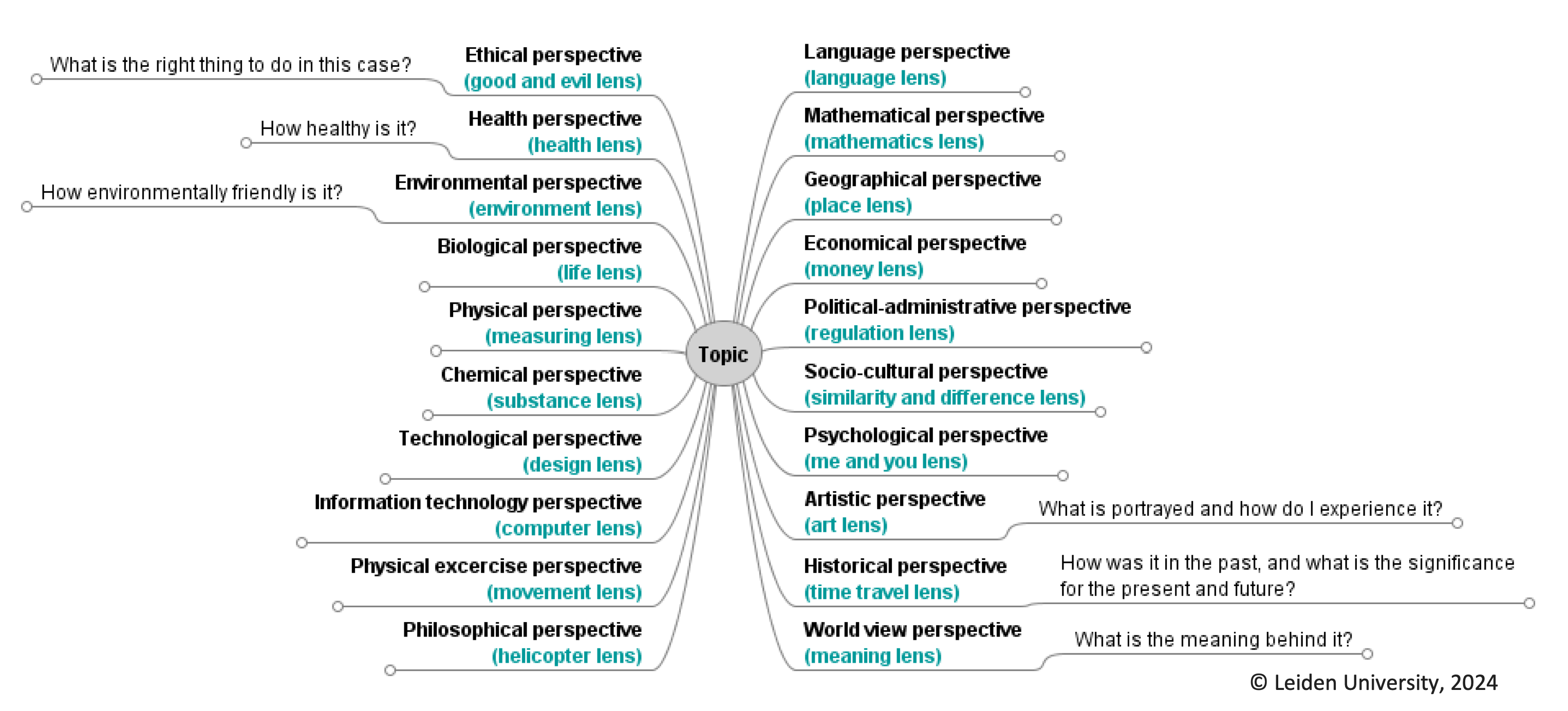A curriculum in 20 perspectives
Perspectives are ways of looking, thinking and interacting with the world. A biologist asks different questions about a topic than a historian or an economist. Thinking about food, for example, a biologist wonders about the need for food of organisms and the nutritional value of different types of food. A historian dives into the evolution of food production. A (bio-) technologist thinks about future developments of food production, an economist about the pricing of food, and a politician about rules and laws in relation to food. So, professions do not only differ in terms of knowledge and skills but also in the way of looking at things, and this determines which questions you ask about a subject. This is also how scientists work. Scientists formulate questions and seek and test answers using big ideas and general insights from their discipline (Giere, 2010; Wimsatt, 2007, Kuipers, 2007).
Let’s look at the geographical perspective. Geography is a school subject that examines the interactions of people, society and nature on earth. A geographer who wants to investigate a topic such as urban agriculture or forest fires asks geographical questions:
- Where is it?
- What is there?
- Why is it there?
- How will it be there in the future?
- How can it be improved?
With this basic set of questions, almost any topic can be explored from a geographical point of view (Janssen, Hulshof, & van Veen, 2019).
In the perspective-based approach, such disciplinary general insights are used to guide students’ knowledge development (Jansen, 2017). Based on curriculum research, we have defined 20 perspectives to cover the entire curriculum of primary and secondary education (Janssen, 2021). These 20 perspectives are largely in line with conventional school subjects, such as language, mathematics, biology, history and geography but also include several other important domains, such as health, environment and ethics.

Whole-task-first approach
The whole-task-first approach underlies almost all educational innovations, such as inquiry-based learning, project-based learning, problem-based education, the master-apprentice approach, task-based education and competence-based education. All these approaches have in common that teaching starts with an authentic task instead of explanation of the subject content to be learned. By embedding subject content into the context of the authentic task, a learning objective is provided, relevant prior knowledge and skills are activated, the relevance of the subject becomes more obvious, and a mental organizer is provided.
In designing whole task education, perspectives provide students a searchlight and thinking tool to structure a complex situation, ask the right questions and search for information to answer and critically evaluate those questions. This can be used in subject-based education, but also in thematic and service-based education. For example, the basic set of geographical questions provides a foundation for the school subject geography and all the topics covered. With these questions, students can study geographical topics at a deeper level, and students learn to think as a geographer.
Many societal issues such as climate change, migration and inequality are too complex to grasp by one school subject. They don’t have one-size-fits-all solutions and require multiple disciplines to find possible solutions. Perspectives have been developed to help students to deal with such complex issues. Perspectives make students aware that there are many different viewpoints on an issue, which often don’t align. Perspectives also help students to structure a complex issue into smaller, more manageable sub-issues. With the basic questions derived from disciplinary general insights, such sub-issues can be widely and deeply studied from different perspectives.
Literature
Giere, R.N. (2010). Scientific perspectivism. Chicago: University of Chicago Press.
Janssen, F.J.J.M. (2017). Grip krijgen op complexiteit. Onderwijs voor het moeras. Oratie Universiteit Leiden.
Janssen, F.J.J.M., Hulshof, H. & Van Veen, K. (2019). Wat is echt de moeite waard om te onderwijzen? Een perspectiefgerichte benadering. Leiden: StudioS2B. Online: https://www.universiteitleiden.nl/onderzoek/onderzoeksoutput/iclon/wat-is-echt-de-moeite-waard-om-te-onderwijzen
Janssen, F.J.J.M. (2021). Een curriculumkader voor vormend onderwijs. Een perspectiefgerichte benadering. Narthex, 21(3), 5-14.
Kuipers, T.A. (2007). Laws, theories and research programs. In Gabbay, D.M., Thagard, P., Woods, J. & Kuipers, T.A. (eds). General philosophy of science: focal issues (pp. 1-97) Amsterdam: Elsevier.
Wimsatt, W.C. (2007). Re-engineering philosophy for limited beings: Piecewise approximations to reality.Cambridge: Harvard University Press.
